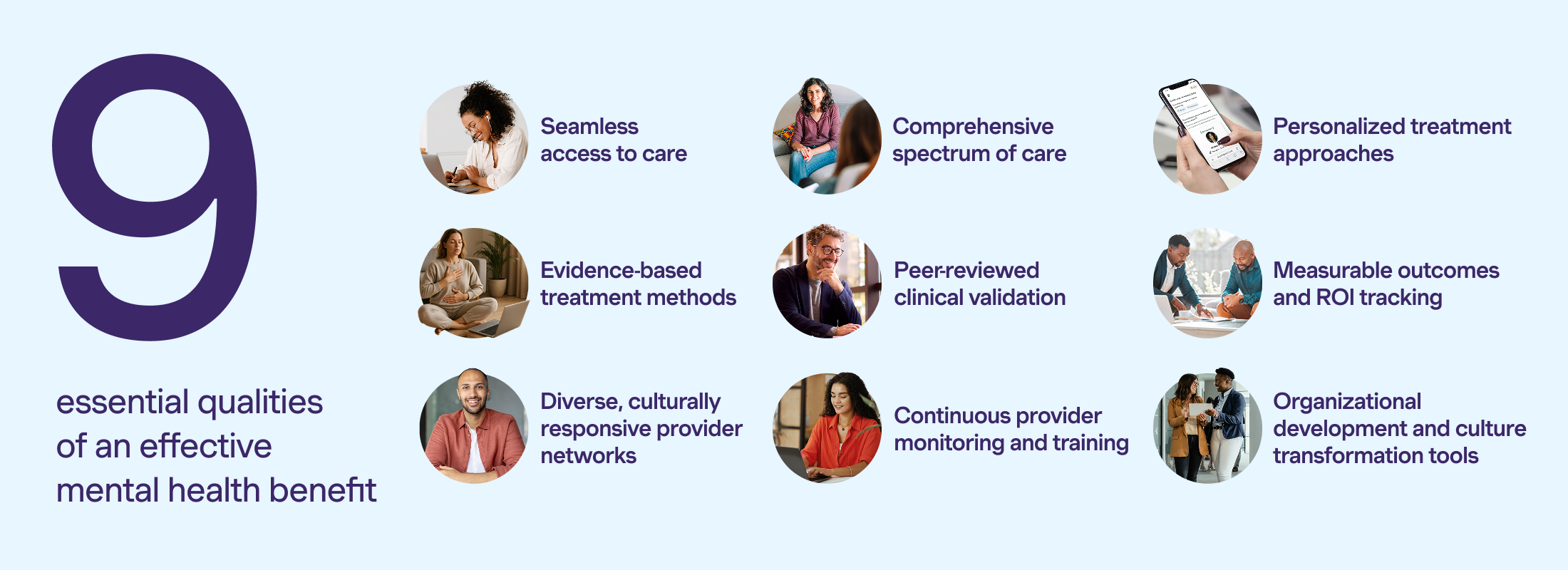Your people need better mental health support, and your leadership team needs to see that it’s working.
But traditional EAPs continue to fall short. Meanwhile, behavioral health needs are rising across every industry, and employee engagement is still lagging.
It’s no longer enough to offer mental health benefits to check a box. Those benefits have to make a real difference. That means helping employees feel better, perform better, and stay engaged while showing measurable outcomes along the way.
That’s where measurement-based care (MBC) comes in. It brings structure, accountability, and precision to mental health support so organizations can move from good intentions to real impact.
According to Spring Health’s 2025 commissioned study conducted by Forrester Consulting, 73% of employers are interested in MBC as part of their mental health strategy. But among providers, adoption remains low, and many employers aren’t demanding more.
So what’s getting in the way? And how can organizations prioritize benefits partners who deliver measurable outcomes?
Our Forrester study, Mental Health At Work: The Benefits Gap and How To Close It, takes a closer look at these questions—highlighting where gaps remain and how forward-thinking organizations are closing them.
Let’s break down why outcomes matter, how MBC supports employee mental health, and what it takes to make it work.
The importance of outcomes
Spring Health’s 2025 commissioned study conducted by Forrester Consulting tells a concerning story about the effectiveness of employee mental health benefits.
Traditional workplace EAPs aren’t built for today’s employee needs.
Forty-four percent of employees report feeling more stress now than five years ago. Although 45% of surveyed employees have access to traditional EAPs, only 30% find their offerings ideal. Just 55% of employees say they’re very or extremely likely to use these supports.
Most employees (74%) feel only moderately supported by their organization’s EAP. These numbers represent a disconnect between what’s offered and what employees are looking for, impacting engagement and ROI.
Traditional EAPs often involve:
- Fragmented support systems that force employees to navigate multiple platforms
- Long wait times
- Limited options for high-acuity or personalized care
Most critically, they lack the data infrastructure necessary to measure whether care is actually improving people’s mental health. Without measurement, treatment decisions are based on gut feelings rather than clear data.
Where there’s no data, there’s no proof of impact, no insight into ROI, and no pathway to meaningful improvement. So, what does MBC look like in practice?

Defining measurement-based care: more than data collection
What exactly is measurement-based care? At its core, MBC is a data-informed approach to treatment under which client symptoms, functioning, and progress are consistently measured using evidence-based clinical assessments.
This starts the moment someone enters care. Measuring symptom acuity provides insight into:
- The kind of care needed
- What level of intensity is appropriate
- Which providers are best suited to address their specific needs
Throughout their care journey, regular touchpoint assessments capture symptom changes and progress, giving real-time feedback to providers and informing treatment decisions and adjustments. When done right, it offers a framework for precision mental healthcare.
Benefits of using MBC in workplace support
For employers, MBC offers visibility into whether care is working. Organizations gain the ability to track macro-level data like engagement rates, improvement percentages, population-level insights, and concrete ROI metrics.
MBC provides the accountability lever that directly connects investment to measurable program impact.
From an employee perspective, MBC means faster improvements, better personalization, and more effective provider matching. It doesn’t add friction to care. Instead, it improves outcomes, reduces unnecessary sessions, and allows providers to pivot quickly when treatment isn’t working.
When done well, MBC supports moving treatment away from guesswork toward quantitative, outcome-driven care.
Barriers to adopting MBC remain
Despite its clear benefits, several significant barriers prevent effective MBC use in employee mental health support programs. Understanding these challenges is the first step toward overcoming them.
- Data integration challenges top the list. Most employers work with multiple mental health vendors–separate therapy platforms, coaching services, and digital wellness tools—that aren’t integrated. Without a unified data infrastructure, HR leaders receive fragmented reporting that makes it impossible to track real-time outcomes or measure ROI across their mental health investments.
- Leadership misalignment creates another major hurdle. Spring Health’s commissioned report reveals this disconnect. At the same time that employees are seeking personalized, high-acuity support options, many executive leaders continue to prioritize more traditional EAP options. This often stems from leadership’s familiarity with conventional solutions.
- Budget constraints compound the problem. Tight benefits budgets push leaders toward traditional EAPs that appear cheaper upfront despite poor engagement rates, reactive and costly approaches to care, and limited ROI. When only 55% of employees are likely to use traditional EAP offerings, organizations essentially pay for unused benefits.
- Stigma and privacy concerns remain persistent obstacles. Even when organizations partner with mental health solutions using MBC, employees may resist using them due to concerns about judgment, career implications, and confidentiality when seeking mental health support.
What leading organizations are doing differently
Over the next three years, surveyed employers expect their reliance on traditional EAPs to decrease 45% to 38%. Instead, they’re investing strategically in several key areas by:
- Expanding access to high-acuity care
- Prioritizing personalized treatment options
- Reducing friction by centralizing the member experience under one integrated ecosystem
- Making leadership training a priority, with companies investing in mental health literacy programs that help managers better support teams and reduce stigma at every level
The most effective training does more than impart basic awareness. It focuses on developing leaders’ emotional intelligence and ability to inspire hope. These are critical skills for creating cultures where employees feel safe seeking mental health support.
Perhaps most importantly, leading employers use outcomes data in their high-level decision-making process.
A roadmap for implementing MBC
Let’s talk about how to implement measurement-based care successfully.
Start with the right partner. Look for mental health benefits vendors who can handle the heavy lifting—those offering validated screening tools, longitudinal outcomes tracking capabilities, and seamless integration across all systems. Without a robust technology infrastructure, scaling MBC is nearly impossible, especially for large organizations.
Prioritize centralized data collection and analysis. An ideal solution should feed insights into every aspect of a mental health solution, enabling automated check-ins, real-time alerts for providers and members, and comprehensive reporting that demonstrates clear ROI.
Focus on key capabilities when evaluating vendors. Ensure they offer real-time data feedback loops, facilitate provider adherence to MBC protocols, track longitudinal outcomes across all care modalities (therapy, medication management, coaching, digital experiences), and deliver clear ROI reporting.
Create accountability at every level. MBC is proven to improve clinical outcomes, so if a solution doesn’t integrate measurement into every aspect of its program while actively pushing adoption, it’s not focusing on what matters most.
Invest in change management. Even the best technology requires organizational support. Plan for leadership training, clear communication about privacy protections, and ongoing education about combating stigma and the benefits of measurement-based care.
How Spring Health is leading on MBC
At Spring Health, measurement-based care isn’t just a concept—it’s at the heart of how we deliver precision mental healthcare. We’ve built an approach that makes MBC real, scalable, and effective for the people who need it most.
Here’s how we make it work:
- Real-time insights that guide care. Our proprietary Compass platform keeps care on track. It continuously monitors symptoms, flags changes, and alerts providers when it’s time to adjust course, so support is always aligned with members’ needs.
- A single, connected experience. All care modalities—therapy, medication, coaching, and more—live in one centralized system. Members can access care through a single login, while providers get the full picture to personalize support from day one.
- Smarter systems that reduce friction. Our AI-powered infrastructure lightens the load for providers by reducing administrative tasks and surfacing key insights early—enabling more proactive, preventive care.
- Built-in accountability and continuous improvement. We’ve woven MBC directly into provider workflows, so progress is measured, outcomes are tracked, and nothing falls through the cracks.
From the start, members complete clinically-validated assessments that guide personalized provider matching and care planning. Throughout treatment, we continue gathering insights through regular check-ins so providers can adapt care in real time, not in hindsight.
It’s all part of making care more connected, responsive, and effective because mental health support should work for every person, every step of the way.
Aligning with industry best practices
Spring Health’s approach directly addresses Forrester Consulting's key recommendations for employers ready to transform their mental health programs:
- Personalized care for different acuity levels: matching employees with appropriate intensity of support
- Investment in preventative care: identifying concerns before they become crises
- Longitudinal data tracking: measuring outcomes over time, not just point-in-time snapshots
- AI-enhanced care at scale: leveraging technology to deliver personalized support to large populations
Building a stronger workforce with data-driven care
Measurement-based care is no longer optional. The data is clear, the need is urgent, and the solutions exist. Organizations that invest in measurable, effective care models see improvements in mental health outcomes, retention, productivity, and ROl.
Employees are asking for better mental health support, and executives are demanding proof of ROI. When implemented well, MBC delivers both. The 73% of employers interested in measurement-based care have the right instinct.
The future belongs to organizations that measure what matters, act on insights, and continuously improve their approach to employee mental health. Now is the time to make sure your organization is among them.
The Forrester study offers a closer look at how leading employers are making this shift and how you can too.








.png)





.png)
.png)
.png)
.png)




















